by Zachary Clemente
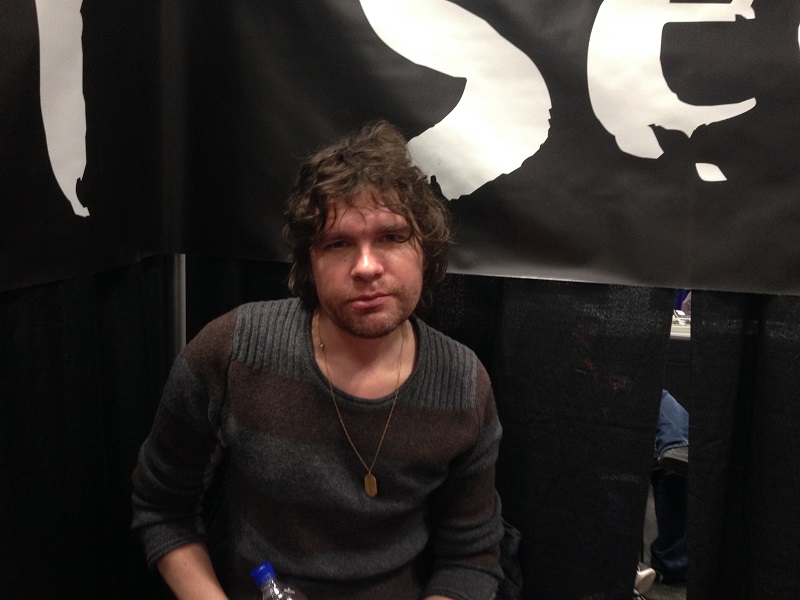
Comics Beat: Paul, have you had a chance to wander the floor or are you only here for the bits you need to be here for?
Paul Pope: That’s the unfortunate thing about working on this side of things, you don’t go as a far anymore. But whatever, it’s not I’m Samuel L. Jackson, I don’t need to sneak in wearing a costume or anything.
CB: So The Rise of Aurora West just came out, how’s the reception been for that so far?
PP: I don’t want to say surprisingly, but I’m very happy to say it’s been very positive. When it came out last Wednesday [9/30] I went out to the west coast and promptly got sick because the tour schedule can be punishing, especially when you’re in airports and schools and you’re not sleeping – it all caught up to me eventually. I was out there for APE but I just couldn’t finished the tour unfortunately, they sent me back and when I got home I slept for 2 days straight. I’ve been rescheduling with all the places I couldn’t get to, figuring out the best to time to get back soon. Hopefully it won’t be too much of a loss.
CB: With Aurora West, you’re choosing to let this world [of Battling Boy] into other creators’ hands. How is the process of – I don’t want to say “sacrifice” – collaboration within this world that you’ve been working on alone for so long?
PP: I talked to Mike Mignola about this not too long ago. […] You know what he’s done with Hellboy has been great because he’s been able to invite other creators. It was pretty early on that it was looking like Battling Boy was going to be a hit, or at least it would warrant a second series. Since I’m still working on the second book and now promoting it, they asked if I had any ideas and I said we should do a series on Haggard West and Aurora – fill in all the gaps that are implied in the first book as I finish the second book, periodically leave town and come back again.
CB: So not only is it wise for world-building but also strategically a good thing for you.
PP: Yeah, also there is a larger backdrop to the characters and to the world; like, the monsters come from somewhere. In the Aurora series, we getting more of a sense of the mystery of where the monsters come from. It’s more of a pulp adventure.
CB: I thoroughly enjoyed it. It felt very rooted in manga with the printing format and art style.
PP: Well, J.T. understands horror and he gets pulp. David Rubín, like myself, comes from a sort of internationalist style and he likes manga a lot. He was able to keep it within a spectrum of style and approach that’s similar to mine and yet still be his own.
CB: It’s rare to see a very successful treatment of somebody else’s work by another artist who can inhabit both styles at once.
PP: Yeah, it was a lot of fun. He’s really fast too, which is great – he’s kicking my ass at the moment, I have to admit. I’m really happy with the results.
CB: Getting into the themes of the book, something I liked was taking the tropes of the “science” [super] hero idea and the consequence and responsibility of power. Haggard provided for this city for so long, when he turned inward, the city couldn’t handle itself. I found that best discussed in the scene with man on the bridge. How did this theme of power and consequence form?
PP: Well, it was one of the things J.T. and I talked about. I went in with my core idea based on the big, super-bible we wrote – we meaning me – for Battling Boy. We started talking about what the reality would be like, having your children stolen and we decided to try to do something where Haggard gets shaken out of his state of depression by having to help another father. I thought it was a good emotional bit – and it’s something we don’t typically see. […] In Battling Boy, it’s a little more breezy and focused on the main five or six characters. You see more in the second book about other citizens, but for the most part it’s just Battling Boy, Aurora, and the city planners.
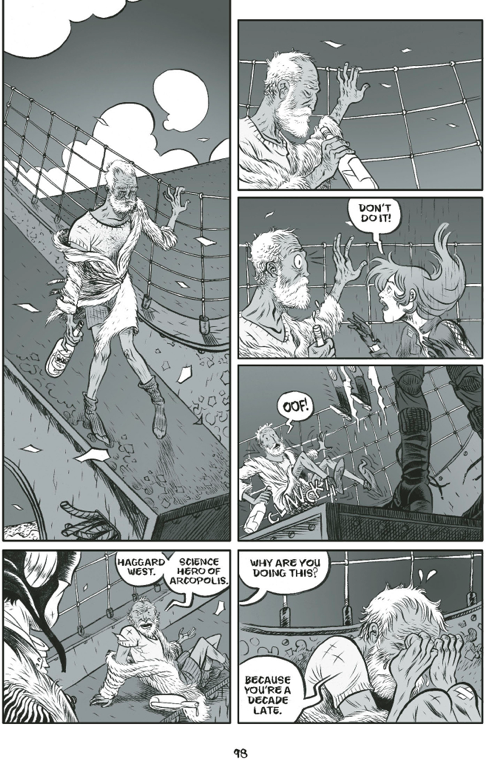
CB: So now we’re getting a larger scope of what’s going on in Acropolis and how it’s dealing with its problems?
PP: Yeah, and obviously Battling Boy, as the name implies, is designed to have lots of explosions and fights and all kinds of stuff like that. Whereas Aurora was more psychological.
CB: It almost felt like the two different sides of Batman books. One’s very detective-based and the other is very action-based.
PP: That was plan going into it, actually. It’s frustrating though. Same with the character Dad in Battling Boy – there were a couple of scenes that I had to write out of Battling Boy that had to do with Dad just kicking ass because for one, that could be its own thing later. I also didn’t want to distract from the core of the story of Battling Boy which was the Boy’s coming of age. In Aurora, it’s the same. Luckily her version of Dad is Haggard; we get to see him without his mask and we get to see him in a family setup.
CB: That leads into my next question which is a big part of both books: would you call Haggard a good father?
PP: That’s a good question, you could ask the same of Dad. I think one of the things that attracted me to writing a story like this was thinking about how being a superhero or war god doesn’t leave you time to raise your kids – you’ll be busy. I’m interested in, fascinated and haunted by that idea of child soldiers. You hear about those types of things in Somalia; to have your child taken away from you. That’s something I find very sympathetic with Aurora and that’s something I wanted to explore with her character – how does she remain innocent?
CB: When we last talked, you said that you had things to say to children with Battling Boy; would you see Aurora as a continuation of that?
PP: One thing people seem to be picking up on with Aurora is that they’re really responding to her as a strong, female lead. She’s a teenage girl; she’s not a sexualized character, she’s not helpless; she’s a sidekick or protégé, but she’s got her own ideas and she does her own things. That’s kind of what her character requires and that’s the kind of personality the daughter of Haggard West would have. It’s been fun. […] Battling Boy is more about–well, they’re both about abandonment in a sense, even though Battling Boy’s family is intact. I think Aurora’s story is more tragic, even though it’s kind of cloaked in this light, superhero, science-fiction setting. There’s archaeology and mysticism, but there isn’t any mythology in it. It’s the opposite in Battling Boy since he’s from the realm of gods.
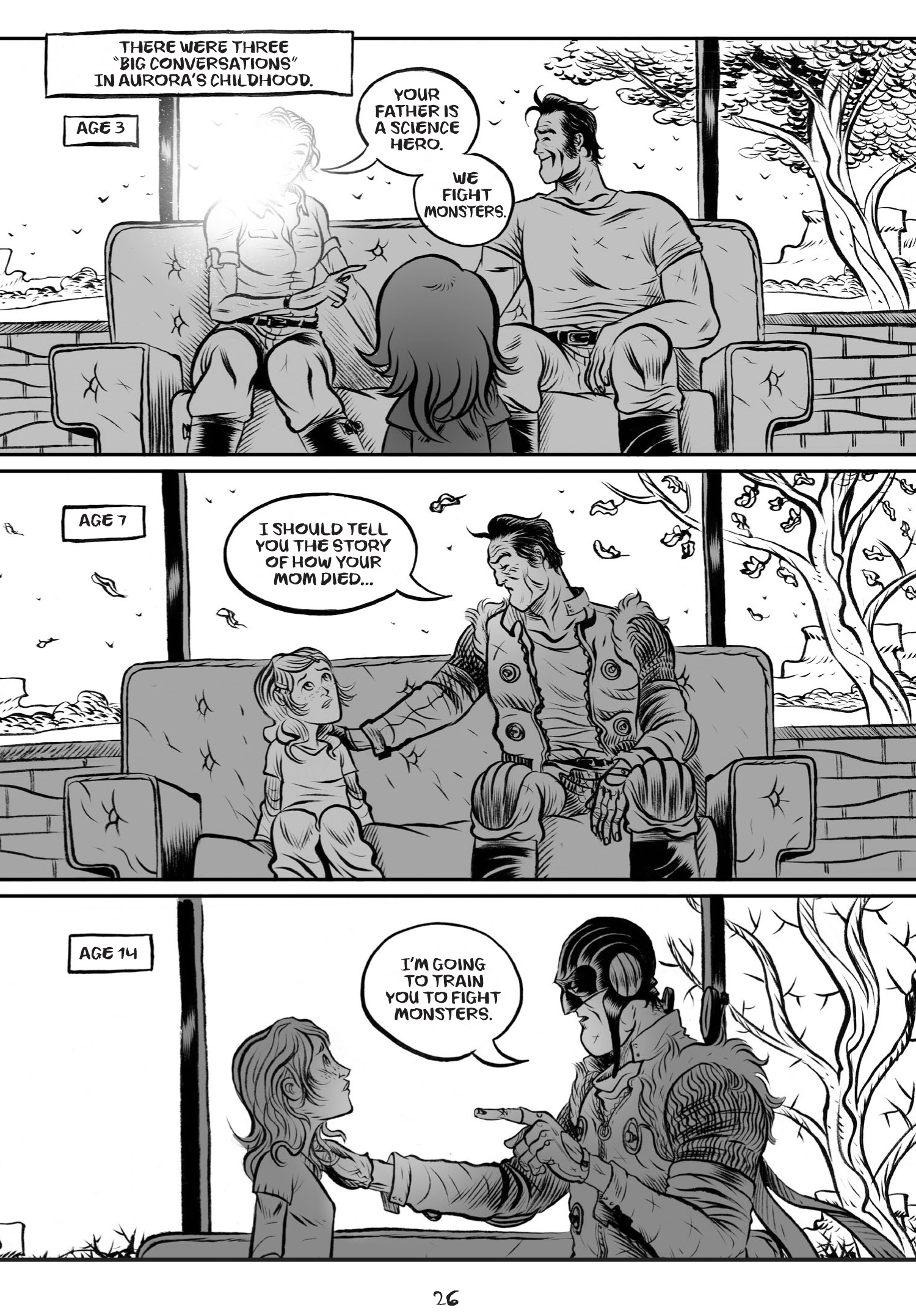
CB: I feel like the archaeology in Aurora is the other side of the coin for Battling Boy‘s mythology. Aurora has this historical scope that I find interesting.
PP: When we went in with the initial pitch for the series, Haggard’s an archaeologist before he’s a hero, and he discovers evidence of an ancient city under the city we know in Battling Boy, and there might’ve been another Battling Boy. The kid is kind of a feral character – it’s implied that Battling Boy has siblings. Imagine, Dad is like a war-god, so he’s probably prolific in line with a lot of mythology. Like with Hercules and Zeus, they have tons and tons of kids. This god of war, god of conquest – he’s going to be busy fighting battles in the realm of gods, so he needs to have offspring to be able to send them to the realm of humans to take care of basically training-wheel problems. There’s a lot of interesting stuff going on in the background that’s coming out as the series develops.
CB: You touched on how the book came about, but how was the process of sharing the writing and where did duties lie?
PP: We did a sort of back and forth. It was his script and I gave him the liberty to write the voice of Haggard. […] Part of my job now as being a story director as well as art director, so I don’t want to tell him how to do his job. He already knows what to do, he already knows how to direct movies and he writes video games and graphic novels – he’s really intelligent. It was more of us spending a few months really hammering out a story based on me saying “here’s what I really want to do.” We’d work on a core plot, knowing where the story begins and ends. At that point, I let him go and do his own thing. There were a few things though; his first draft was too violent because he likes horror. […] There was some stuff with the characterization that I thought was a little off mark from what I was hoping for. Otherwise, I think the script came in really solid and it hit all the things I wanted. I try to give my collaborators room – I got that from Mignola because he told me that’s how he works with people.
CB: You did something like that with Vertigo anthology, Ghosts where you made the story but didn’t write the script.
PP: Oh you mean with Dave Lapham? Yeah, that was a good experiment. […] I might be doing something else with another guy where I’m drawing something he’s gonna write. The way we worked on the space opera story was I said “here’s what I see: this mini-opera, there are the images I want.” Then we kicked around some ideas and he came up with some interesting stuff. That was more of a true collaboration in a sense because we wrote it together.
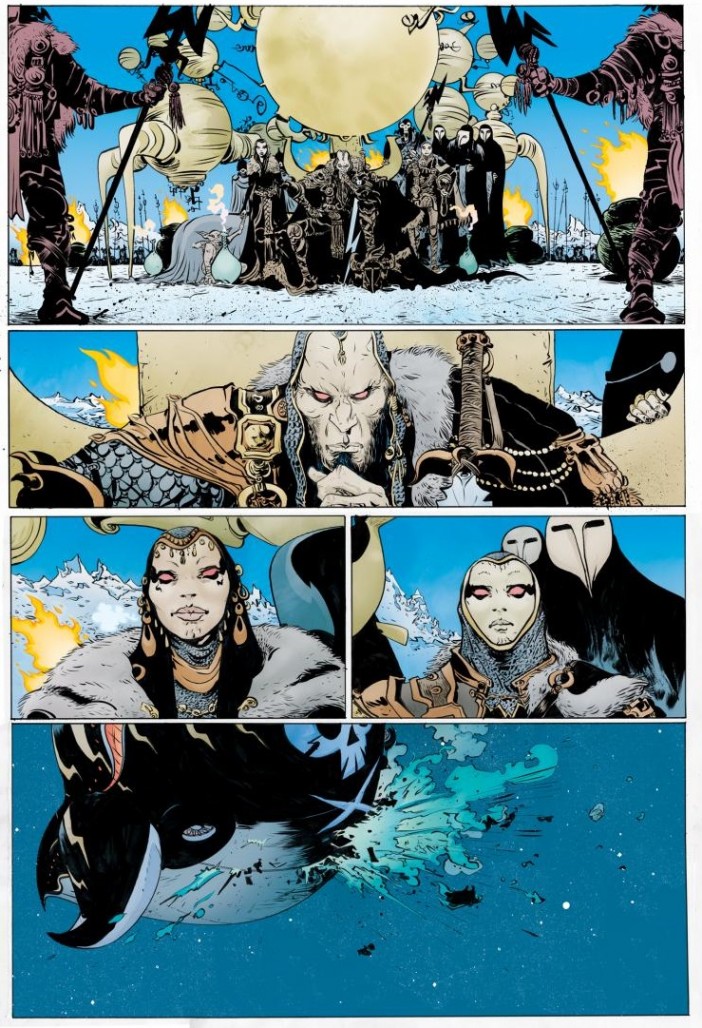
CB: How far are you willing to take this collaboration with the Battling Boy world?
PP: Well…it’s easier now after having worked on the film because there’s so many people involved; you can’t be a dictator when it comes to film. With the Battling Boy series that I have been writing and drawing, it’s pretty much my baby; I get minimal editorial input. With the colorist, Hilary Sycamore, she and I have a long conversation before she starts a large stretch of work. I always try to give her the sense of what I’m feeling for a scene. For example, the god realm is always in twilight, the human realm is always Mediterranean with terracotta and aquamarine colors, and the monster realm is like hell so it’s browns and reds.
The place I can be 100% myself is in Battling Boy and as we gradually expand on the series, I want to make sure to pick out people I like and respect and can work with and try to write or direct for their strengths, while being aware of their weaknesses. I think that’s the way to collaborate.
[Spoiler for Aurora West] CB: At the end of Aurora, the monster Coil mentioned that Aurora is his “animus” in the Jungian idea of one half of a whole inside the other and vice versa. Is that a discussion on the origin of monsters and their connection to the children in Battling Boy?
PP: [Laughs] You’re onto something there. Let’s just put it this way: the big boss that we see at the end of Battling Boy who Sadisto is working for is a scribble monster. It’s implied, by the time you hit Aurora, that these monsters might be very old, many of them aren’t even fully formed creatures yet. Yeah, there’s definitely a connection between that and that’ll be coming out as the series develops. Good call on that one.
CB: So, “The Fall of the House of West” – is that the second Battling Boy book itself?
PP: No, that’ll just be called Battling Boy 2. Ultimately, they’ll both be collected – I’m imagining Aurora as a two-parter: Rise of Aurora West and Fall of House West. It’s designed more around this kabuki stage set: tragedy and family. So act one is the rise and act two is the fall; that was definitely very conscious on our part. David wasn’t happy with the title at first; he thought, having come from film and a lover of westerns, he’s seen this type of thing a lot. Like with Battling Boy implies; it’s about a boy who’s fighting. Rise of Aurora West–first of all, it sounds alliterative and The Fall of the House of West has kind of a Shakespearean feel.
CB: I find that both Battling Boy and Aurora are well-described by their titles. As the stories utilize these touchstones in storytelling that people have come to expect, but works with them in such a unique way. The titles end up being evocative for their stories.
PP: Yeah, what’s really fun about it is meeting all these young readers. A lot of them are 10 or 12 years old and they’ve really never read comic books before. They might’ve read Adventure Time or Tintin, but this is the first time a lot of these kids, especially girls, are getting the sense of Kirby Krackle or Moebius. Certainly they know Ghibli’s movies like Spirited Away going into it, but for the first time they’re getting opened up to what we think of as Silver Age comics or awesome French comics from the 70’s.
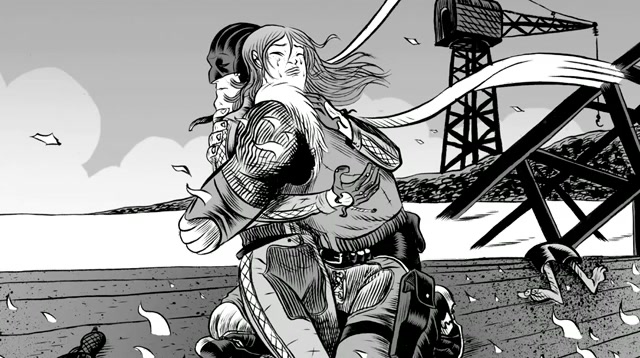
CB: We might be seeing a lot more of those Nausicaä boxed sets flying off the shelves soon.
PP: I love that film, though Laputa is my favorite, but it’s hard to say as there are so many good ones.
CB: I ultimately fall on Porco Rosso as my favorite.
PP: He [Hayao Miyazaki] said he made it for guys our age. Porco Rosso is a big influence on the coloring in Battling Boy.
CB: I totally see that. It’s all coastal, Mediterranean cities.
PP: I was Italy when I was writing Battling Boy, I just really fell in love with the south of Italy; the lighting and the colors, the way the sea looked on the Adriatic coast. At nighttime with the volcanoes in the distance, it’s so romantic and old. It fits with the ideas I had for Arcopolis; it isn’t like Berlin, 1945- dark and scummy. It’s this old and vibrant city that’s fallen on bad times.
CB: That makes sense with your work and European influences, I think. The recorded history there is just so much older.
PP: Even more so for Africa and Asia. That’s why, in Aurora, the analog for the oldest city is Egypt. I was thinking about all this stuff, but I wasn’t really able to put it across. Where Haggard lives in the city, his decor is very Pacific Northwest – it’s a lot of fun to draw.
CB: It’s got a very collector vibe to it, too.
PP: Yeah, something I noticed with some of the heroes from occult fiction, whether it’s Sherlock Holmes or Lamont Cranston – they collect a bunch of ancient artifacts and stuff. Indiana Jones is like that too, but he’s a thief.
CB: It has those classic Campbellian story elements; out of travel a hero is born.
PP: Actually, Haggard belongs to an explorers club like National Geographic and we’ll see more of those characters later. I’m going to do an annual portrait of Haggard with his compatriots, so in that sense, he’s a little like Doc Savage. Like in Buckaroo Bonzai, he’s got his gang if he needs a specialist in this or that.
CB: Wrapping up, other than Mignola’s “Hellboy-verse”, are there any other series with larger built-up worlds that have this kind of multi-thread publication structure that you’re inspired by?
PP: One big influence is definitely the RKO [Pictures] and Universal [Pictures] movie series from the 30’s and 40’s like Flash Gordon. […] There’s always the classic Universal monster movies, German expressionism and early Soviet-era cinema; whether it’s Eisenstein or Fritz Lang – those are big influences. That’s the fun thing, in the same way that Battling Boy is full of my love of Kirby, Moebius, and Miyazaki, the same of true for Aurora. It’s like a flipped coin – the dark side like Boris Karloff, H.P. Lovecraft – these kind of things, it’s more of a vintage feel.
That works with J.T. because he directs horror movies; he’s writing The Walking Dead video game, I don’t know if you know that. He has a wicked sense of humor and a wicked sense of the wicked, and he also has two children. We got lunch a couple days ago after a signing and we had a long conversation; we got into some dark stuff. [In Aurora] monsters are kidnapping children and we started talking about some really gruesome stuff and it’s like “this is where it’s coming from.”
CB: Thank you very much Paul.
PP: Sure, thank you.
Paul Pope is an Eisner-winning cartoonist currently in Brooklyn, New York. He is actively working on his Battling Boy series with publisher First Second. You can find more of his work on his website.


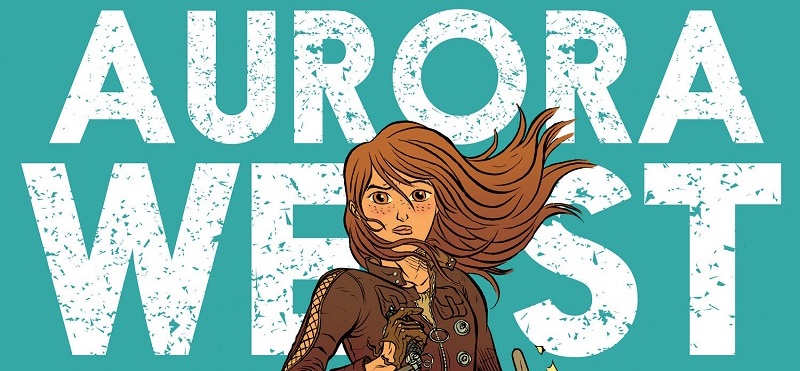
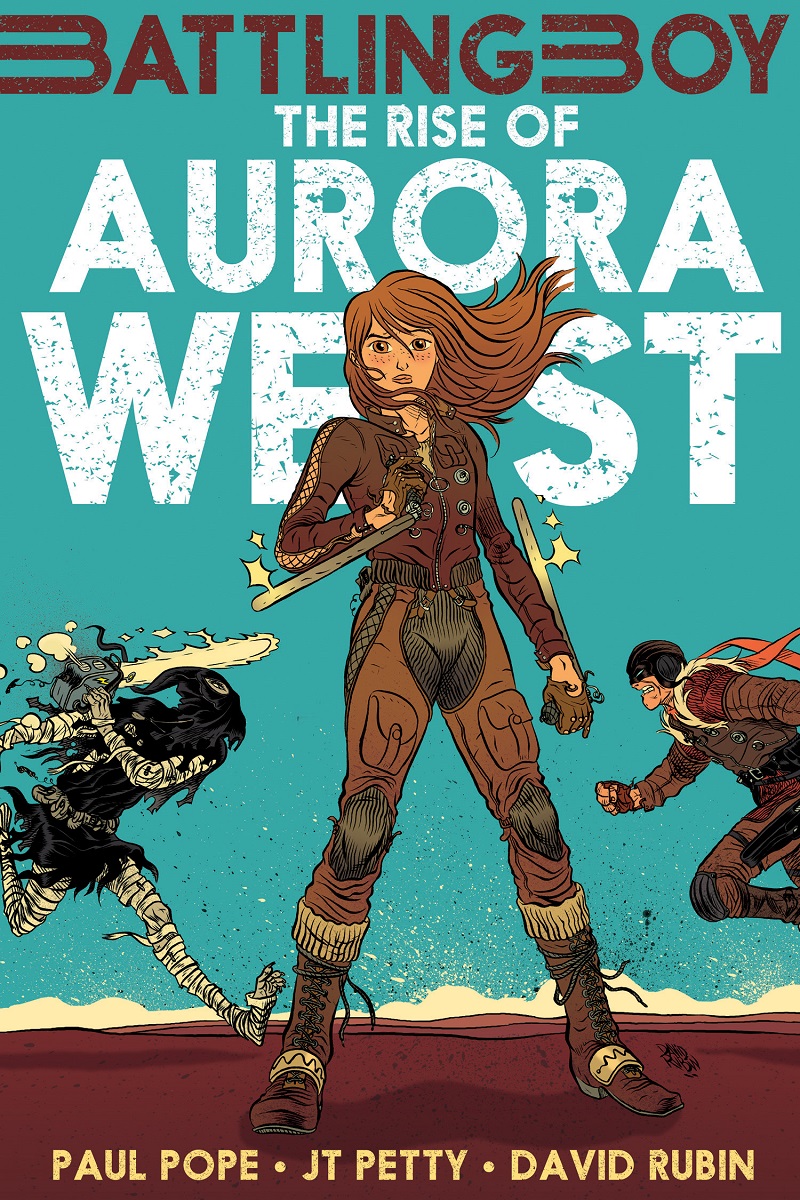
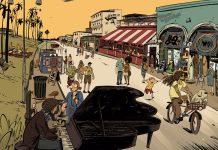
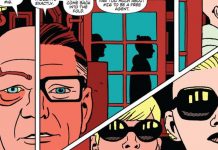



Comments are closed.